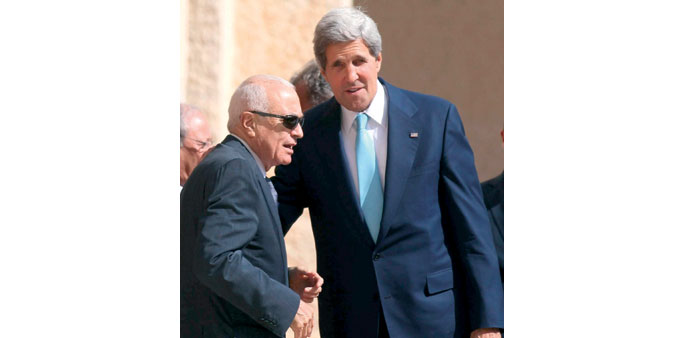Arab League Secretary General Nabil al-Arabi and US Secretary of State John Kerry at Al-Hummar Palace in Amman yesterday.
Reuters/Amman
The Arab League endorsed the drive to relaunch Palestinian-Israeli peace negotiations led by US Secretary of State John Kerry, who said gaps between the sides had been greatly narrowed.
The encouraging rhetoric after Kerry met an Arab League delegation and Palestinian President Mahmoud Abbas in Jordan yesterday suggested that Kerry, on his sixth such peace mission to the Middle East in as many months, might have found a path to ending an almost three-year deadlock.
The main sticking point has been Israel’s continued building of settlements on occupied land where Palestinians want to found a state. Israel approved new settlement yesterday.
The 22-nation League also confirmed a recent compromise on its 11-year-old peace proposal to Israel; it said old borders could be redrawn.
The official Petra news agency in Jordan, where Kerry met Abbas for a second time in two days, quoted an Arab League statement issued after League officials also met Kerry there. The bloc affirmed “its support for Kerry’s great efforts to revive peace talks between the Palestinian and Israeli sides”.
The League delegation “expressed hope that this will lead to a launch of serious negotiations to address all final status issues to end the conflict and achieve a just and comprehensive peace between the Palestinians and Israelis which will bless the region with security, stability and prosperity”.
Abbas has given no public indication of his intentions. Aides said he would meet other PLO (Palestine Liberation Organisation) leaders in Ramallah today ahead of deciding whether to resume talks with Israel.
Kerry, briefing reporters in Amman, was upbeat.
“We have been able to narrow these gaps very significantly,” he said. “And so we continue to get closer and I continue to remain hopeful that the sides can soon be able to come and sit at the same table.”
He did not elaborate, citing a need for discretion.
A positive Palestinian decision, if one were to emerge today or soon thereafter, would be the first tangible sign of progress in Kerry’s nearly six-month drive to revive the Israeli-Palestinian peace process, now largely overshadowed by upheaval in Egypt and civil war in Syria.
Abbas has in the past said settlement expansion must stop before talks with Israel can get under way. Netanyahu has called on him to return to negotiations unconditionally.
Israel granted initial approval yesterday for the construction of 732 new homes in Modiin Ilit, a West Bank settlement midway between Jerusalem and Tel Aviv.
At the news conference, Kerry held out the prospect of the rewards Israel could reap in a deal leading to the creation of a Palestinian state on land seized in the 1967 Middle East war.
He said Israel should consider carefully a 2002 Arab League peace initiative that it rejected in the past.
“Israel needs to look hard at this initiative, which promises Israel peace with 22 Arab nations and 35 Muslim nations - a total of 57 nations that are standing and waiting for the possibility of making peace with Israel,” he said.
The plan, put forward by Saudi Arabia at an Arab League summit in 2002, offered full recognition of Israel if it gave up all land it had occupied since 1967 and agreed to a “just solution” for Palestinian refugees.
Softening the plan three months ago, a top Qatari official raised the possibility of land swaps in setting future Israeli-Palestinian borders. Tzipi Livni, the Israeli cabinet minister responsible for efforts to restart Palestinian talks, at the time called Qatar’s move “good news that should be welcomed”.
The League statement yesterday confirmed that shift, speaking of the Arab peace initiative as providing for “an independent Palestinian state on the lines of June 4, 1967 with a limited exchange of territory of the same value and size”.

